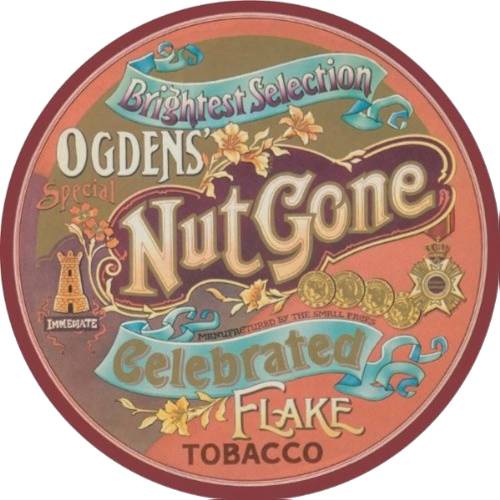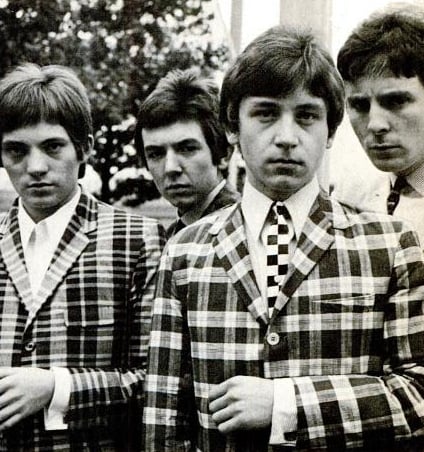In the heart of the 60s' musical revolution, Small Faces emerged as a blazing comet in the London sky. Embodying the essence of the Mod movement, the band left an indelible mark on rock history with their dazzling brevity and rare intensity. Today, let's dive into the world of Small Faces, through captivating anecdotes and an unforgettable musical legacy.
Born in the twists and turns of London's East End, Small Faces formed in 1965, from the meeting of Steve Marriott, Ronnie Lane, Kenney Jones, and Jimmy Winston (the latter quickly replaced by Ian McLagan). Their name, a nod to their short stature and affiliation with the Mod movement, perfectly reflects their identity: familiar faces in the crowd of young London mods.
“All we wanted to do was play our music and wear cool clothes,” Marriott once said. This simple yet powerful philosophy catapulted Small Faces to the top of the charts, with hits like “Itchycoo Park”, “Lazy Sunday”, and “All or Nothing” – anthems that still echo in the hearts of fans.
Beyond their commercial success, Small Faces were pioneers, sound explorers in search of an authenticity lost in show business. Their concept album “Ogdens' Nut Gone Flake” is a cornerstone of musical innovation, blending rock, R&B, and psychedelia with whimsical narration that prefigured progressive rock.
Despite their breakup in 1969, following Marriott's departure to form Humble Pie, the legacy of Small Faces endures. The band has not only influenced generations of musicians but also left an indelible imprint on pop culture. “Small Faces were the epitome of cool. They had something nobody else had,” Kenney Jones perfectly summarizes.
Small Faces remain a bright star in the rock galaxy. Their journey, though brief, was marked by authenticity, passion, and talent that continue to inspire. Amidst the tumult of the 60s music scene, they created a unique universe, a legacy that still resonates today in every note of their legendary discography.
The album : Ogdens' Nut Gone Flake
Released in 1968, “Ogdens' Nut Gone Flake” breaks conventions and invites on an unprecedented sonic and narrative exploration. Dive into the story of a work that has forever marked the musical landscape through this article.
“Ogdens' Nut Gone Flake” emerges in a context of bubbling creativity for Small Faces. The band, consisting of Steve Marriott, Ronnie Lane, Kenney Jones, and Ian McLagan, embarks on the adventure of this album with the ambition to transcend musical boundaries. Inspired by the name of a tobacco brand, the album is intended as an escapade into varied sonic universes, from rock to psychedelic music and R&B.
The recording sessions for the album bear witness to a period of intense experimentation. Recorded primarily at Olympic Studios in London, “Ogdens' Nut Gone Flake” benefits from technical innovations and total artistic freedom. The band employs avant-garde recording techniques, such as passing the voice through a Leslie speaker, to create unheard sound effects.

Upon its release, “Ogdens' Nut Gone Flake” is met with enthusiastic acclaim from both critics and the public. The album quickly reaches the top of the British charts, solidifying Small Faces' position as leading figures in the psychedelic music scene. Critics praise the album's boldness, inventiveness, and its ability to transport the listener on an extraordinary musical journey.
The impact of “Ogdens' Nut Gone Flake” far exceeds the 60s. The album is considered one of the first concept albums in rock history, foreshadowing major works in the following decades. Stanley Unwin's narrations, with their whimsical language, and the richly orchestrated compositions continue to inspire musicians and music fans around the world.
“Ogdens' Nut Gone Flake” by Small Faces remains a cornerstone of psychedelic music, a timeless masterpiece that continues to fascinate and inspire. Through its technical and narrative daring, this album redefined the contours of popular music, leaving an indelible imprint on musical history.
The song : Lazy Sunday
At the heart of Small Faces' album “Ogdens' Nut Gone Flake” lies a track capturing the very essence of Sunday tranquility, “Lazy Sunday”. With its melodious introduction and witty lyrics, this song stands out as the epitome of the carefree mood the band embodied so well.
“Lazy Sunday” opens a window onto London life with a pronounced Cockney accent, reflecting the band's humble beginnings. The lyrics humorously narrate neighborhood squabbles, a universal theme that resonates well beyond the Small Faces era. This choice of subject, both down-to-earth and deeply human, perfectly illustrates the band's artistic approach: finding poetry in the everyday.
The recording sessions for “Lazy Sunday” showcased the band's desire to break musical conventions. The innovative use of phasing and sound effects, like rooster crows and spoken dialogues, adds a theatrical dimension to the song, enhancing its narrative character. It's this blend of pop music and theatricality that marked a turning point in music production of the time.
The reception of “Lazy Sunday” served as a true barometer for changing musical tastes. Praised by critics for its originality and freshness, it also enjoyed commercial success, proving that audiences were ready for more experimental sounds. This song thus helped cement Small Faces' reputation as forerunners in the psychedelic and mod music scene.
As for covers, “Lazy Sunday” has inspired various artists such as The Libertines over the decades, attesting to its enduring influence. Each rendition brings a new flavor to the song while paying tribute to the innovation and humor that characterize Small Faces' original work.
Where to listen to Ogdens' Nut Gone Flake?
- Listen to Ogdens' Nut Gone Flake on Spotify
- Listen to Ogdens' Nut Gone Flake on Deezer
- Listen to Ogdens' Nut Gone Flake on Youtube

